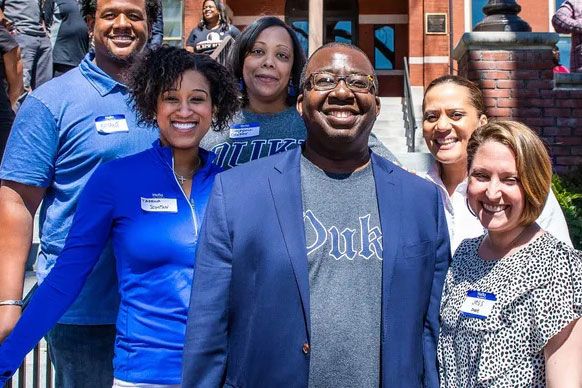Black Alumni Uniting to Make Change
National Black Alumni Collective Conference at Duke to focus on leveraging Black alumni leaders for advocacy and change

Traditionally, college graduates support their alma maters. But a group of Black college graduates from various institutions, ranging from Howard University to Oxford University to Duke University, believe there is power in connection and the collective voice of Black alumni to make change.
To continue that vision, the Black Alumni Collective will be hosting a national conference at Duke University April 28-May 1, 2022.
The Black Alumni Collective was created in Atlanta in 2018 by alumni leaders from more than 10 schools, including Duke University, with the vision that Black alumni from universities across the country should know each other and work together to achieve a common purpose. They wanted to not only improve campus life but life after graduation in their communities.
“We want to go forward, go higher…there’s power in a collective voice,” said Sanders Adu ’94, the conference co-chair. “We are targeting 500 Black alumni from more than 50 schools. We have reached out to HBCUs, large state schools, and private schools."
The four-day event will be in-person and was preceded by a virtual conference in March that featured a conversation among several university presidents and panel discussions exploring the role of Black leaders in media and technology, as well as how Black athletes are collectively lifting their voices for social change.
Highlights of the in-person conference include discussions on navigating Black health disparities, Black voting and political power, Black economic power, and Black women’s leadership roles throughout society, said Tadena Simpson '05, another conference co-chair.
Speakers include Dr. Eugene Washington, chancellor for health affairs at Duke and president and CEO of the Duke Health System; Blayne Alexander ’08, NBC News and MSNBC correspondent; Satana Deberry J.D.’94, M.B.A.’06, district attorney for Durham County, N.C.; and dozens of Black leaders in the fields of medicine, technology, business, law, nonprofit organizations, and more.
"There will be something for everyone,” Simpson said.
In addition, conference attendees can tour Duke's campus and take note of Black contributions to
Duke's history, like Duke Chapel, designed by the Black architect Julian Abele, and the recentlv christened Wilhelmina Reuben-Cooke Building, named for one of Duke's first Black undergraduate students. She went on to become a lawyer, law professor, university administrator, and trustee for both the university and The Duke Endowment.
Local Black nonprofits and prominent Black business owners will also be highlighted with the goal to support the Durham Black business and nonprofit communities.
For more information about the conference, visit the Black Alumni Collective website.